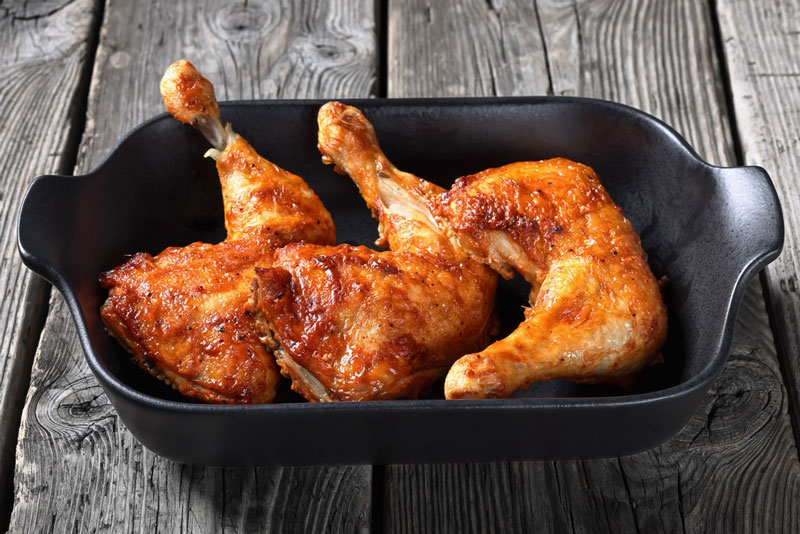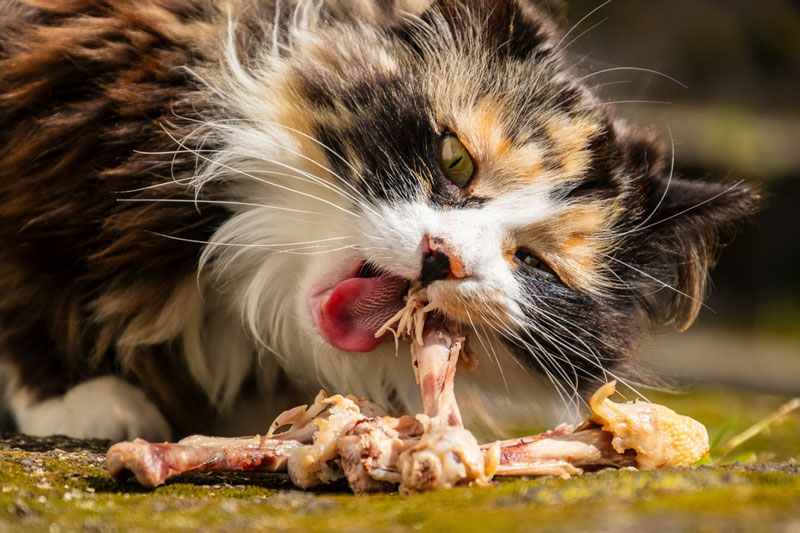Can cats eat chicken? This is a question many cat owners find themselves asking, especially when they’re considering what to feed their feline friends. The answer is yes, cats can eat chicken! In fact, chicken is often a popular protein source in cat’s diets. Packed with nutrients and delicious flavors, it can be a treat for your kitty that they will almost certainly enjoy. But as we explore this topic further, we’ll also look into the best practices for serving chicken to your cats and potential risks to be aware of too.
Chicken is generally a tasty and protein-rich food that our furry companions simply adore. However, it’s important to ensure that we are providing it in a safe manner, as our felines have unique dietary needs. By reading on, you will become better informed about the ins and outs of feeding chicken to your cat, making it easier for you to decide how to incorporate this tasty treat into your kitty’s diet. So let’s embark on this tasty adventure together and learn all the juicy details!
You might also be interested in: Can Cats Eat Fried Fish?
Can Cats Eat Chicken?

When we think about our furry friends and their food, it’s essential to remember that they have specific nutritional needs. Cats are obligate carnivores, which means that they thrive on a diet primarily composed of meat. So naturally, chicken makes an excellent option! Not just tasty, chicken is also a great source of protein, which is essential for maintaining strong muscles and a healthy weight. Gradually integrating chicken into your cat’s diet can be beneficial, but it should be a supplementary addition to their primary cat food, which is designed to meet all their nutritional requirements.
It’s important to note that before serving your cat chicken, you should always cook it thoroughly. Raw chicken might contain harmful bacteria that can give your cats a tummy ache or worse! Always be cautious and make sure to remove bones, skin, and any seasonings before offering it to your fur baby. If you’ve ever seen a cat devour a piece of cooked chicken, you know that their eyes light up with pure joy! Just be sure to serve it in moderation, as too much of any one ingredient can lead to an unbalanced diet.
How Much Chicken Can Cats Eat?
The question of how much chicken a cat can eat has a few factors to consider, including your cat’s age, weight, and overall health. As a general rule, treats should only make up about 10% of your cat’s daily calorie intake. This means that chicken, while delicious, shouldn’t replace their balanced cat food. If you’re unsure about portion sizes, it’s wise to start slowly. You can begin by offering small amounts of cooked chicken as a reward for good behavior or just to show your love.
As we learn more about portion sizes, it might help to think of your cat’s average daily caloric needs. On average, an adult cat requires around 20 calories per pound of body weight. So, if your kitty weighs ten pounds, they would need around 200 calories each day from all food sources combined. If you are planning to give your cat a small portion of chicken, say about 1 ounce, it would be around 40-50 calories. That would make up only a small fraction (like 20%) of their daily calories. We want to keep chicken as an occasional treat rather than a leading role in their meals.
Don’t forget that each cat is unique! Some cats might have sensitivities or allergies, while others might just not enjoy chicken that much. Pay attention to how your particular cat responds to chicken, both in terms of taste and any potential digestive reactions. If they start showing signs of distress, such as vomiting or diarrhea, you might want to rethink the frequency and portion size of the chicken you are giving them.
Additionally, if your cat has special health concerns, it’s best to consult your veterinarian for personalized recommendations. After all, we all want our feline companions to thrive and be the happiest kitties on the block!
Benefits Of Chicken To Cats
1. Nutritional Value: Chicken is packed with protein, which is a vital nutrient for our cats. Protein helps in supporting muscle growth, repairing tissues, and even boosting their immune system. When we serve chicken, we are not only treating our cats but also providing them with the essential amino acids they need, which are crucial for their overall health.
2. Tasty Delight: It’s no secret that most cats love chicken! The taste and texture make it an enjoyable treat for our furry pals. This can also encourage picky eaters to try new foods or simply make mealtime more exciting and delightful for them. A little excitement can go a long way, especially when it comes to ensuring that they maintain a healthy eating habit.
3. Easily Digestible: For many cats, chicken is easier to digest compared to other meats. This can be especially beneficial for cats with sensitive stomachs. Utilizing chicken as a treat can help them get the nutrients they need without causing digestive issues. It’s somewhat amusing how something so simple can make a huge difference in their day-to-day lives.
4. Convenient Protein Source: Chicken is a convenient and readily available protein source. Many owners can easily cook a small piece of chicken while preparing their own meals. Leftovers can be easily saved and served as a treat later, making chicken a simple addition to our cats’ diets. With the advance of freezing, we can batch-cook chicken and store it for future treats, making life a little easier!
5. Encouraging Hydration: Often, we forget that hydration is key, too! If we opt for boiled chicken, it might come with some moisture that can contribute to our cat’s water intake. Cats are notoriously finicky drinkers, so every drop of water counts! We can aid our furry pals in their hydration journey with this protein-packed treat.
Dangers Of Feeding Chicken To Cats
It’s important to always keep in mind that there are some risks associated with feeding chicken to our cats. Just saying “yes” without thinking it through can lead to some issues that we’d rather avoid.
The most significant concerns arise when feeding raw chicken. Raw meat can harbor harmful bacteria, such as Salmonella and E. coli, which can wreak havoc on our cat’s gastrointestinal systems. We want our kitties to enjoy that tasty chicken, not suffer from foodborne illnesses. Cooking the chicken properly can significantly reduce these risks. It’s safety first, right?
Another risk is the presence of bones, which can splinter and cause choking or internal injuries to our cats. If we serve chicken, we must ensure it is boneless. It’s a simple step that can help keep our felines safe and secure. Seeing our cats happily chowing down on a delicious meal is much more comforting than worrying about a visit to the vet.
Allergies can also be a concern. Just like humans, cats can develop food allergies, and chicken is a common culprit. If we notice our furry friends developing itchy skin, vomiting, or diarrhea after eating chicken, it may be worth stopping its consumption and consulting with a vet. No one wants to see their beloved pet uncomfortable.
Lastly, a high serving of chicken can lead to an imbalanced diet. Cats need a mix of nutrients, not just protein! So it’s ideal to keep chicken as a side treat rather than the main dish. Balance is the key to a healthy and well-rounded meal for our precious kitties!
Substitute Of Chicken For Cats
1. Turkey: If your cat is a fan of chicken, they might also enjoy turkey! Just like chicken, turkey is another lean protein that can work as a great alternative. It’s often lower in fat and still packs a punch in nutrients. Plus, it might be a nice change of pace for your feline friend!
2. Rabbit: If you want to really spice things up, how about rabbit? It is often considered a “novel protein,” which means it might be beneficial for those cats with food sensitivities. And let’s face it, most cats have that primal instinct of being hunters, and rabbit might just bring out their inner lion.
3. Fish: Ahoy, cat owners! Let’s not forget about fish as another protein alternative. Many cats enjoy the taste of fish, but remember that moderation is key. Too much fish can lead to your cat developing an upset tummy. So please don’t go tossing them tuna every day, even if we know they would love it!
4. Lamb: Lamb might be another tasty alternative, anything to bring a smile to our kitty’s face! It has unique flavors that can have our pets tail-wagging with delight. It is higher in fat, though, so be cautious about portion size. Offering lamb as an occasional treat can be a fun surprise for your fur baby!
5. Commercially Prepared Cat Food with Protein: Sometimes, it’s all about convenience. There are many commercially prepared cat foods on the market that include high protein sources like chicken or other meats. Many of these are formulated to meet a cat’s dietary needs. This can be an easy solution if you’re ever short on time or just want to be sure your cat is getting a balanced meal. A little planning can go a long way!
Can Cats Eat Chicken? Frequently Asked Questions
Can Cats Eat Raw Chicken?
Many experts recommend against feeding raw chicken to cats due to the risk of bacteria that can cause food poisoning. It’s always safer to cook the chicken thoroughly before serving it to your cat.
Is It Safe To Feed My Cat Chicken Bones?
No, we should never feed our cats chicken bones, as they can splinter and cause choking or internal injuries. Always remove bones before serving chicken to your cat.
How Often Can I Feed My Cat Chicken?
Chicken should be served in moderation, making sure it only accounts for about 10% of your cat’s daily caloric intake. It’s best to use it as an occasional treat rather than a regular meal.
What If My Cat Doesn’t Like Chicken?
That’s okay! Not all cats will enjoy chicken. If that’s the case, you can explore other protein options that might be more appealing to your feline, such as turkey, fish, or even rabbit.
What Should I Do If My Cat Has A Bad Reaction To Chicken?
If you notice any signs of discomfort or allergic reactions after your cat has eaten chicken, such as vomiting or skin irritation, stop feeding chicken immediately and consult your veterinarian for advice.
Final Thoughts
Feeding our cats chicken can indeed be a delightful experience for both us and our furry friends. If we serve it safety and in moderation, we can enjoy seeing their happy little faces light up at dinnertime. Remember to always prioritize your cat’s safety by ensuring the chicken is cooked and free of bones. Monitoring their reactions to the new treat is also key to making mealtime enjoyable without any tummy troubles.
Don’t forget that there are many other delicious protein options that we can explore as well. Every cat is unique, and we might find that they enjoy a variety of meats, helping us keep their diets balanced and exciting! If you’re curious about more topics regarding what other foods are safe or unsafe for your pets, be sure to check out our blog for interesting articles on pet nutrition and care.


